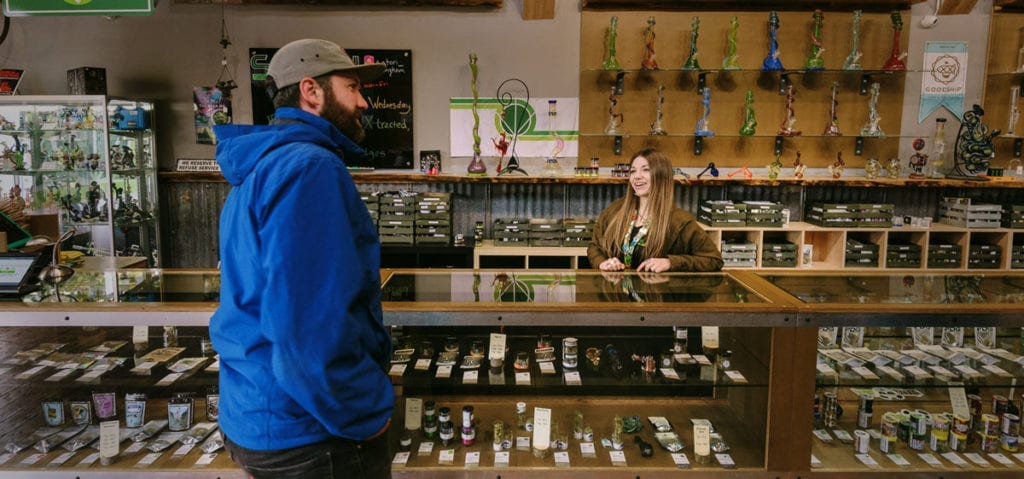Experiential retail is on the rise in every industry. Traditional brick-and-mortar stores now have to provide services and experiences that customers are unable to replicate at home. Whether it be the flashy set up of The Apple Store or the upscale feel of the Nespresso boutiques, we see experiential retail all around us in shopping centres. This immersive experience versus a traditional retail outlook coincides with the younger generations’ (led by Millennials) desire to own less “stuff” and to, instead, spend their money on experiences in general.
For the emerging cannabis industry, the timing of this retail shift is fortuitous. In most North American regions, cannabis cannot legally be purchased online anyway, but cannabis retailers have the opportunity to create experiential retail from the start, instead of trying to retrofit their business models.
Recently, JLL Retail issued a report outlining the six dimensions of experiential retail: intuitive layouts, positive human interactions, meaningful brand values, immersive brand experience, and accessible and personalized experiences. It might sound overwhelming, but some cannabis companies are embracing this new way of doing retail business.
One such cannabis company leaning into the experiential cannabis retail model is Chalice Farms in Oregon. Their mission is clear: provide the best products and retail experiences to the consumer, backed by research and science. They are upping the experiential retail ante and becoming an industry leader in the process.
Stepping into a Chalice store is a unique experience compared to traditional dispensaries. Customers are no longer presented with tie-dye motifs and an onslaught of products. Instead, they’re met with clean, easy-to-understand counter-top displays and select quality product lines. This intuitive approach to cannabis retail puts new users at ease and allows more seasoned ones to streamline their experiences. And because Chalice’s parent company, Golden Leaf Holdings, also has access to the entire process from the farms to the stores, the products are always guaranteed to be safe, well researched, and high quality. As the retail cannabis market matures, those companies with expertise in winning over, nurturing, and retaining customers in a competitive marketplace will prevail.
The strategy is to create a brand that embraces localization and uniqueness, not a national brand with clones across the country. These are brands that go full tilt with interactive experiences in brick-and-mortar locations and online, engaging and nurturing millennial customers who are poised to be 35% of total spending by 2030, according to Forbes. On top of that, 52% of America’s 55 million cannabis consumers are millennials, according to a 2017 survey by Yahoo News and Marist College.
The challenge is building a successful retail network, which takes more than having a great idea or even one great store. The retail market is quickly changing and ensuring success across multiple markets and locations while still maintaining quality products and brand awareness takes certain skill sets, knowledge, and willingness to push boundaries.
When thinking about key trademarks of a successful retail network, here are some best practices to consider:
-
Balance = Key
Stores must offer consumers something they cannot get either at a competitor’s shop or online: a holistic experience. This new wave of experiential retailing has come on strong over the last few years and is here to stay. Cannabis companies have specialized in serving these niche markets that cultivate their customers’ sense of buying into something larger than themselves. And, while these retail experiences can – and should – be tweaked to favor local markets, the branding and overarching feeling while in the shop must be consistent across retail locations.
-
Knowledge = Power
Customer and location data, consumer insights, and spending habits are all important, but the real key is knowing what to do with the data once you have it. This is especially true in an emerging retail market such as cannabis. Because the market is still new, market insights need to be interpreted and implemented correctly. Cannabis companies such as GGB have brought in a leadership team that has experience in large-scale, multinational, data-driven retail growth that can break into new markets intelligently.
-
Differentiate Your Customer Experience
Successful retail brands thrive on creating differentiated customer experiences while still associating with the brand at large. This often comes from sales associates moving into a more of a concierge role giving personalized recommendations with an expert eye, or integrating user data into future needs or community-building. These customized, differentiated experiences help the customer feel like they can associate with a brand without becoming “just a number.”
Plenty of international research shows how millennials more than most appreciate this kind of engagement, which they can then share on Instagram and in turn bring more followers into the tribe. These digital natives research and know how much things cost, so they demand extra special attention if they are going to be convinced to actually buy.
While the cannabis industry is still somewhat emergent, there will soon be a time when cannabis retail is no longer a novelty. When that point comes, the cannabis companies who have taken the time to consider and invest in the holistic customer experience will be the ones poised for long-term success.
End
